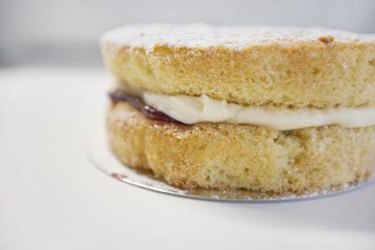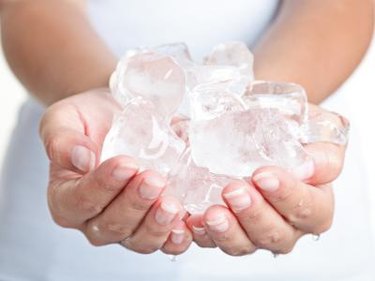
Receding gums, also called gingival recession, refers to the exposure of the roots and nerves of teeth due to a loss or retraction of gum tissue. Receding gums are a common problem in Americans 40 years and older, and often occur as a result of poor oral hygiene. Avoiding certain foods may help reduce symptoms or the progression of the condition. Consult with your dentist about causes and prevention of receding gums.
Receding Gums
Video of the Day

There are several possible causes for gum recession such as abnormal tooth position, insufficient gum tissue, overaggressive brushing, dental infections, eating disorders, chewing tobacco, teeth grinding, according to the book "Harrison's Principles of Internal Medicine." Bacteria, plaque and tars can accumulate in your mouth and eat away at your gum tissue. Gum recession takes many months and years to become noticeable or symptomatic. Common symptoms associated with receding gums include sensitive teeth, tooth pain from exposed nerves, bad breath, tooth discoloration, inflamed gums, and gums that bleed easily with flossing or brushing.
Video of the Day
Avoid Acidic Foods

Bacteria and other pathogenic microorganisms thrive in an acidic environment, which then contribute to gum disease, inflammation and receding, according to the book "Human Biochemistry." Further, excessively acidic foods can damage the protective layer of your teeth. Examples of acidic foods and beverages include excessive consumption of meats, citrus fruits, white bread, pasta made with white flour, pickled and fermented foods, alcoholic beverages, coffee and black tea.
Avoid Sugary Foods

Sugary foods are highly acidic and provide potential bacteria with an easy food source, which is why excessive consumption of sugar greatly increases the incidence of dental cavities and gum diseases, according to the book "Advanced Nutrition and Human Metabolism." Examples of sugary foods and beverages include candy, donuts, cakes, muffins, chocolate, soda pop, energy drinks and liqueurs. Chewy carbohydrates with gluten, such as white bread and donuts, stick to your teeth, and can get caught between your teeth and gums when they recede, which contributes to gingivitis or gum-tissue inflammation.
Avoid Cold Foods

When your gums recede, the nerves that supply your teeth are exposed, which make them more sensitive to cold foods and beverages. Avoiding colds foods such as ice cream, snow cones, popsicles, ice cubes, and refrigerated fruits and vegetables may reduce some of the pain that is commonly associated with receding gums. Crunching on ice cubes, or any hard foods such as nuts, may loosen teeth that have become weak due to receding gums. Instead, eat or drink room temperature or heated items that are soft in texture. Further, ask your dentist about special toothpastes that are designed to reduce tooth sensitivity.